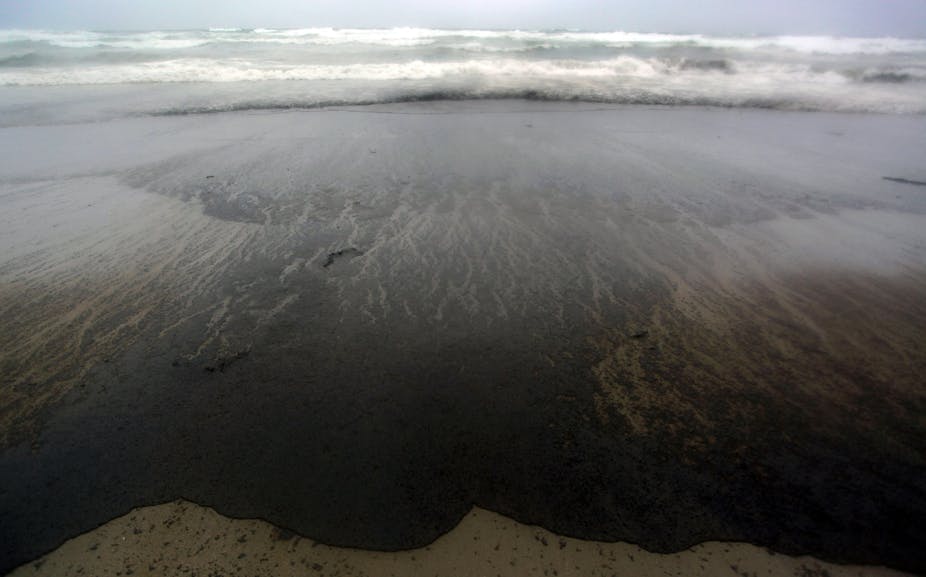Last week the Rena, a Liberian-registered container ship, ran aground on Astrolaube Reef in the Bay of Plenty, around 12 nautical miles from the New Zealand coast. The stricken vessel has been stuck there ever since and is now listing badly.
Some 88 containers have fallen from the ship (several containing highly hazardous materials) and hundreds of tonnes of fuel oil have been spilled in the marine environment and are now washing ashore.
Although the sea conditions have been very heavy, clean up and salvage operations for the Rena have continued and it is hoped that most of the remaining fuel oil will be safely transferred to a nearby barge.
But the fate of the Rena is uncertain. Maritime New Zealand, the government agency responsible for responding to maritime emergencies, has said that the vessel could break up at any point. This is of major concern as it would result in further loss of hazardous cargo, and more fuel oil being released into a sensitive marine environment.
It is over 20 years since the Exxon Valdez disaster in Prince William Sound Alaska prompted a thorough rethink of international marine pollution laws. As the maritime disaster in Bay of Plenty unfolds, we need answers to a key question: can we improve marine pollution standards and their enforcement even further?

It is also timely to consider whether there are implications for the control of marine pollution in Australia, given similar incidents have occurred in Australian waters.
There are striking parallels between the Rena incident and the Shen Neng 1 oil spill on the Great Barrier Reef in April 2010, when the Chinese-registered bulk coal carrier hit a shoal near Great Keppel Island. Shen Neng 1 released only a small amount of oil, was far less badly damaged, and was successfully salvaged.
Thankfully, incidents such as the Bay of Plenty oil spill have become far less common in recent decades, despite the almost-exponential increase in maritime traffic worldwide.
The main reason for this is the adoption of ever-tighter rules by the International Maritime Organisation (IMO) in London. These fall under the MARPOL Convention to which all major maritime states are party (including Liberia).
MARPOL rules cover maritime pollution and safety issues in extraordinary detail, from the construction and operation of vessels to minutiae such as the discharge of sewage. And they are increasingly well enforced by coastal and port states, meaning vessel operators are not able to hide as well as they used to by flying “flags of convenience”.
IMO rules are implemented at a national level by IMO member states. New Zealand has done this through its Maritime Transport Act 1994. Under this legislation two Rena crew members have already been charged for operating the vessel in a manner causing unnecessary danger or risk.
The incident occurred just within the New Zealand 12 nautical mile territorial sea, and well within its 200 nautical mile Exclusive Economic Zone, so there is no question that New Zealand can assert this jurisdiction.
It is not widely known that national rules cannot generally be any stricter than the IMO rules. The central reason for this is that ship operators want consistency, so that wherever their vessels are navigating the same standards apply.

This is generally not a problem, as the “floor” for the pollution rules is now higher than it has ever been. But there are marine environments where governments should be able to take a more muscular approach to limit the risk of casualties even further.
The best-known example is the Great Barrier Reef which has been declared a Particularly Sensitive Sea Area (PSSA) by the IMO. Here, the Australian Maritime Safety Authority administers a system of compulsory pilotage, requiring ships to take on board expert navigators familiar with local conditions. The Australian Government extended the compulsory pilotage scheme to the Torres Strait in 2006 after the strait was also recognised as a PSSA.
However, we have recently learned from diplomatic cables obtained by WikiLeaks that the compulsory pilotage scheme has been wound back in face of protest from Singapore and the United States that the scheme infringes navigational freedoms.
The causes of the Rena disaster are yet to be determined. But the incident does demonstrate in general terms that now is not the time to reverse the trend towards stricter maritime safety standards in sensitive marine environments.
While the risk of maritime casualties can never be eliminated, the dice can be loaded against disaster through schemes such as that pilotage rules in the Great Barrier Reef and Torres Strait.
Australia and New Zealand need to take the initiative and introduce stronger marine pollution rules. But more than that, we will have to stare down attempts by major maritime powers to stymie those innovative developments.

